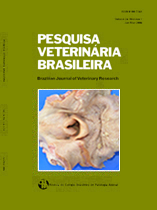 |
|
|
|
Year 2011 - Volume 31, Number 5
|

|
Validation of a radioimmuno-assay for the quantification of fecal testosterone metabolites in the Syrian hamster (Mesocricetus auratus), 31(5):459-463
|
ABSTRACT.- Chelini M.O.M., Oliveira C.A. & Otta E. 2011. [Validation of a radioimmuno-assay for the quantification of fecal testosterone metabolites in the Syrian hamster (Mesocricetus auratus).] Validação de um radioimunoensaio para a quantificação de metabólitos fecais de testosterona no hamster Sírio (Mesocricetus auratus). Pesquisa Veterinária Brasileira 31(5):459-463. Departamento de Psicologia Experimental, Instituto de Psicologia, Universidade de São Paulo, Av. Prof. Mello Moraes 1721, São Paulo, SP 05508-030, Brazil. E-mail: marodile@usp.br
Besides being models for a variety of human diseases, hamsters have been object of numerous behavioral studies about stress and agonistic behavior. Such studies usually involve hormone change monitoring. The aim of the present study was to confirm the suitability of a commercial kit for human serum testosterone analysis to quantify testosterone metabolites in the feces (MFT) of male and female Syrian hamsters. Ten males were submitted to a GnRH challenge test to stimulate testicular activity and increase circulating testosterone levels. Five females received a testosterone injection and five other females were given a saline injection. Fecal samples collected before and after the procedures, and fecal samples collected from 20 pregnant females through gestation were analyzed for MFT with a commercial radioimmunoassay. The detection of a MFT peak 12 h after GnRH administration followed by a decrease under baseline showed that, in males, changes in the levels of MFT are related to respective changes of testosterone concentrations in the blood. Again in males a circadian cycle of MFT similar to the circadian rhythm described in literature for blood concentrations was detected. The administration of exogenous testosterone caused in females a dramatic peak of MFT. However, the concentrations measured through gestation did not reflect the pattern of endogenous testosterone blood levels as described in the literature. Therefore, the use of a radioimmunoassay for human blood testosterone was validated in male Syrian hamster, but a more specific assay would be necessary for female hamsters. |
| |
|
|
| |
|
 |